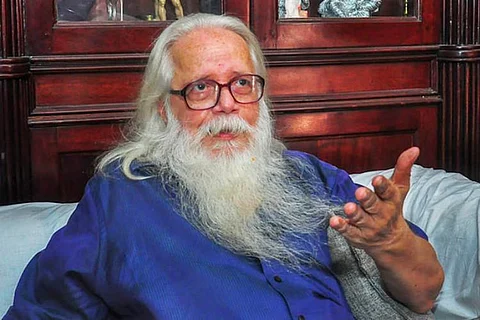

Nambi Narayanan, the former scientist of the Indian Indian Space Research Organisation (ISRO), has been conferred the Padma Bhushan, the third-highest civilian award in the Republic of India. The scientist was instrumental in developing the Vikas engine that would be used for the first PSLV that India launched. But, Nambi Narayanan, who was falsely implicated in the ISRO spy case, was accused of selling state secrets comprising confidential test data from rocket and satellite launches. He was arrested in December 1994 and charged with espionage.
On September 14, the Supreme Court cleared the scientist of charges in the infamous ISRO espionage case and also directed the Kerala state government to pay him Rs 50 lakh as compensation. It was the first time that the Supreme Court erased all the adverse records against him to restore his reputation. The three-judge bench, comprising Chief Justice of India Dipak Misra and Justices AM Khanwilkar and DY Chandrachud, had said, "The criminal law was set in motion without any basis. It was initiated, if one is allowed to say, on some kind of fancy or notion. The liberty and dignity of the appellant which are basic to his human rights were jeopardized as he was taken into custody and, eventually, despite all the glory of the past, he was compelled to face cynical abhorrence," the judgement read.
The bench also said, "If he obtaining factual matrix is adjudged on the aforesaid principles and parameters, there can be no scintilla of doubt that the appellant, a successful scientist having national reputation, has been compelled to undergo immense humiliation. The lackadaisical attitude of the State police to arrest anyone and put him in police custody has made the appellant to suffer the ignominy…The Court cannot lose sight of the wrongful imprisonment, malicious prosecution, the humiliation and the defamation faced by the appellant".
In October 2018, Rajeev Chandrasekhar, BJP MP from Bengaluru, had appealed to the Union government to honour the scientist with a Padma award. In his letter, the MP had highlighted some of the greatest achievements of the scientist.
"Nambi Narayanan, who was a senior scientist at ISRO, was in-charge of the cryogenics division making rapid progress in the field of liquid technology – a key technology in rocket propulsion that is being deployed in GSLV. He was one of the chief architects of the ‘Vikas’ engine that is at the heart of India’s rockets, the same ones that made missions like Chandrayaan and Mangalyaan possible and which will be involved in many more space voyages in future. Vikram Sarabhai, the father of Indian Space, put his trust in Narayanan and sent him to Princeton University for higher studies on rocket propulsion. He could have been the next pioneer in rocket propulsion and space technology.”
However, the arrest in 1994 brought his career to a standstill and mental agony to him and his family.
Following his arrest by the Kerala police, the case was transferred to the Intelligence Bureau (IB) for investigation and was in custody for 50 days. After his release, the scientist claimed that the IB officials, who interrogated him, wanted him to testify falsely against some of his superiors.
When the Central Bureau of Investigation took over the case, no evidence linking Nambi Narayanan to the accusations against him was found. In 1996, the CBI dismissed the charges against him. Subsequently, in 1998, the Supreme Court declared him not guilty and awarded him a compensation of Rs 1 lakh, which was to be paid by the Kerala government.
The scientist then approached the National Human Rights Commission, seeking compensation for the torture and mental agony that he and his family members were subjected to during the course of the false case against him.
The scientist was instrumental in developing the Vikas engine that would be used for the first PSLV that India launched.